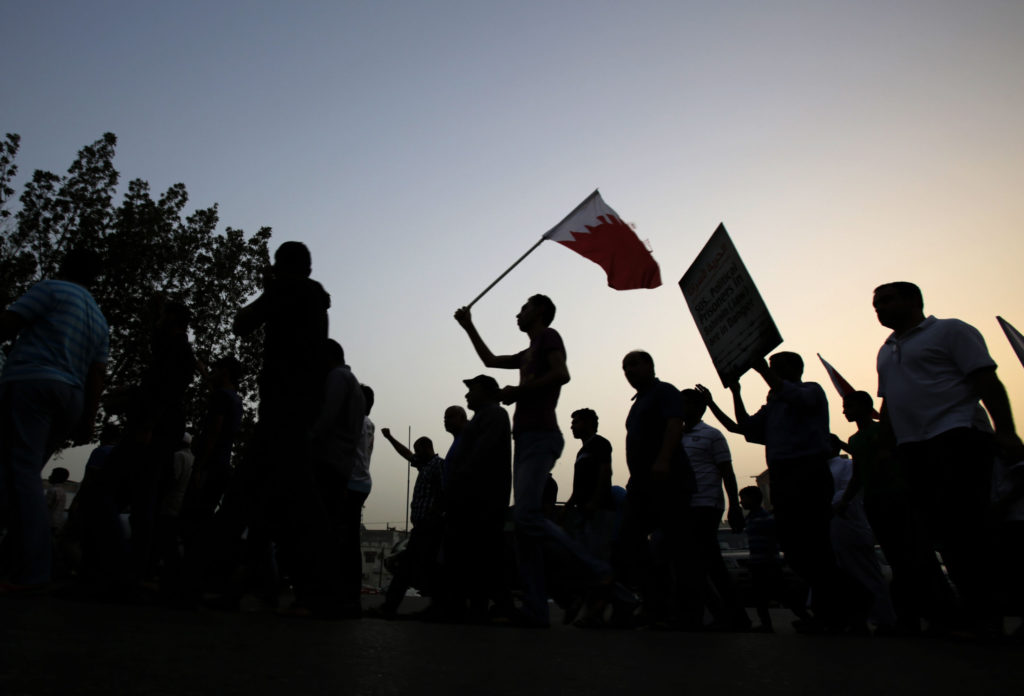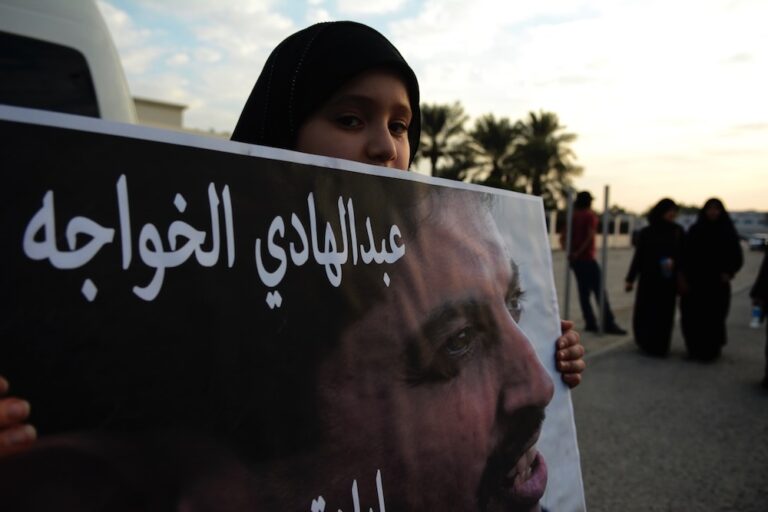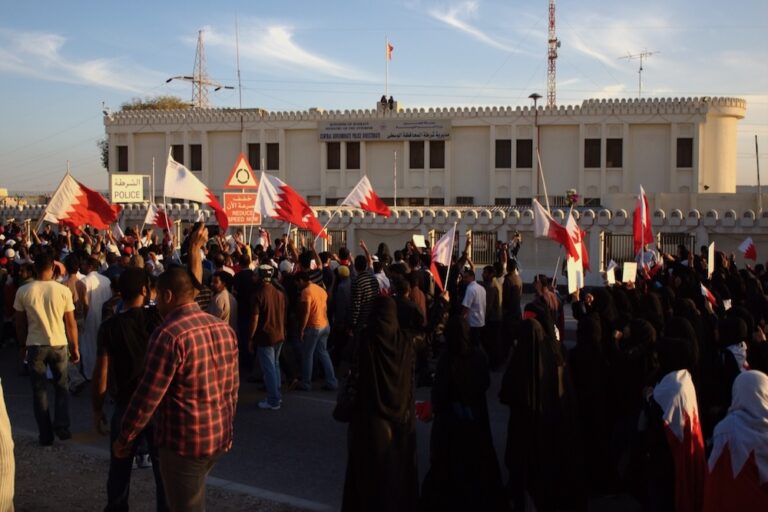Hopes that the heavy handed response to the pro-democracy movement that sprang up in Bahrain in 2011 would be investigated and that justice would be brought for those who had suffered violence at the hands of police have not only collapsed, but the situation for freedom of expression and human rights has taken a nose dive.
Journalists and human rights defenders have been imprisoned, peaceful demonstrators have been rounded up amidst reports of torture, and there have been killings. At the same time, key countries such as the UK and USA have become less inclined to condemn the abuses.

We as human rights defenders are targeted for giving voice to the marginalized, people seeking to take the reins of their own destiny; our governments do everything in their power to prevent us from acting upon the best ideals of our conscience.
GOVERNMENT:
Bahrain is a constitutional monarchy led by King Hamad bin Isa Al Khalifa, who succeeded as emir on the death of his father in 1999, and became King when Bahrain transitioned to a Kingdom in 2002. Its head of government, Prime Minister Prince Khalifa bin Sulman Al Khalifa, also a member of Bahrain’s monarchy, has held the post since 1970. Bahrain’s legislative body is formed of a 40-member Consultative Council appointed by the King, and a 40-member Chamber of Deputies elected by universal suffrage. Parliamentary elections held in 2014 were boycotted by the opposition Al-Wefaq party in protest at what they saw as unfair process. In their absence, 37 of the 40 seats were won by independents. Al-Wefaq was shut down by the authorities in 2016; and its Secretary General, Sheikh Ali Salman, is currently serving a four-year prison sentence for political speeches calling for reforms to Bahrain’s political system. In 2017, Wa’ad, the last major opposition party, was dissolved.
CAPITAL: Manama
POPULATION: 1.43 m
GDP: US$ 32.2 bn
MEMBER OF:
Arab League
Gulf Cooperation Council (GCC)
Non-Aligned Movement (NAM)
Organisation of Islamic Conference (OIC)
United Nations
IFEX MEMBERS WORKING IN THE COUNTRY:
Americans for Democracy and Human Rights in Bahrain (ADHRB)
Bahrain Centre for Human Rights (BCHR)
Gulf Centre for Human Rights (GCHR)
PRESS FREEDOM RANKING:
Reporters Sans Frontières World Press Freedom Index 2018 166 out of 180 countries

FILE- In this Jan. 18, 2012 file photo, an anti-government protester stands in front of riot police while photographing other demonstrators in Manama, Bahrain. Local media in Bahrain are reporting that a court has ordered the country’s main Shiite opposition group to be dissolved. The order against Al-Wefaq follows an intensified crackdown on dissent in the Sunni-ruled island kingdom, which is home to the U.S. Navy’s 5th Fleet. (AP Photo/Hasan Jamali, File)

A religious power rift: a human rights crisis
One of the seven Gulf States, Bahrain – which name means “two seas” – has for centuries been ruled under the Al Khalifa monarchy. Having a majority Shia population, but led by a Sunni King and where its most wealthy and influential citizens are also Sunni, is a source of tension that has spilled over into conflict over the years. Most critical of these were demonstrations inspired by the 2011 democracy movements in Tunisia and Egypt which continue to this day. In February 2011, tens of thousands of people took to the streets and were met with a brutal armed response. The situation escalated in March, when a three-month state of emergency was declared, the government turned to the Gulf Cooperation Council for support, and Saudi troops were called in to quell the unrest. During this time, hundreds of people were arrested, tortured and sentenced. Others were killed or died in custody.
Since then there have been numerous demonstrations against the monarchy and demanding human rights, leading to further arrests and convictions. The situation deteriorated sharply from mid-2016 with the crackdown on the Shia opposition Al-Wefaq party, the arrest of its leader, and of Shia clerics who protested. In January 2017, a moratorium on the death penalty that had held since 2010 was broken with the executionof three Shia men convicted of killing three police officers in a 2014 bomb attack. Their trial was condemned as deeply flawed and based on confessions extracted under torture. The executions were met with outrage and sparked more protests. Then in May, five demonstrators were killed and 300 more arrested when police broke up a protest against the arrest of a leading Shia cleric. In June the Al-Wafeq party was dissolved, accused of supporting terrorism.
In its September 2017 report, ‘No one can protect you: Bahrain’s year of crushing dissent‘, Amnesty International calls the situation a ‘full blown human rights crisis’ with over 160 people arrested that year, ranging from human rights defenders, journalists, activists and Shia clerics, reports of torture, as well as harassment and threats.

Promises for an end to impunity dissolve
Yet, back in late 2011, there was some hope. Seemingly bending under international pressure, the Bahraini government set up an Independent Commission of Inquiry to look into abuses committed between February and June 2011. In November that year, the Commission published its report that identified 26 areas for reform that would bring accountability, justice for victims, a moratorium on the death penalty and protection for freedoms of expression and assembly, among others. Although initially accepted by the government, not only have these recommendations not been met, the situation has deteriorated, and measures have been put in place that harden the government and military’s stronghold over dissent. One such move is the April 2017 constitutional amendments that enable the military to try civilians – a move that has alarmed human rights monitors who fear that government critics could be the prime targets for prosecution by these courts.

Human rights defenders arrested, tortured and imprisoned
Meanwhile there has been no investigation into the killings and abuses by government forces, nor has there been justice for victims. New abuses against rights defenders proliferate.
• One of the most high profile cases is that of Nabeel Rajab, a human rights defender and founder of the Bahrain Center for Human Rights and the Gulf Center for Human Rightswho has been constantly harassed and arrested. In May 2012 he was imprisoned for two years for ‘insulting a statutory body via Twitter’. He was detained again in June 2016 for his tweets criticising Bahraini armed forces abuses in Yemen, where Bahrain is part of a coalition fighting Shiite Houthi rebels. Held in detention ever since, Rajab’s health deteriorated drastically as his trial was repeatedly delayed and postponed. To add to this, in July 2017 he was given another two year prison sentence for interviews he gave on Bahrain’s poor human rights record in a trial he was unable to attend because of poor health. In February 2018, Rajab was handed another five years in jail for tweeting criticisms of Saudi Arabia’s human rights violations in the war in Yemen and for documenting allegations of torture in Bahrain’s prisons. The conviction was upheld by the court of appeal in June 2018.
• Torture and abuse of political prisoners are commonly cited, and for women there is the added danger of sexual abuse. For example, in July 2017, rights activist Ebtisam al-Saeghwas seized from her home by police. Two months earlier she had been arrested by national security agents for questioning about a demonstration where five people had been killed, and also about her participation at a UN Human Rights Council session in Geneva in March that year where she had spoken on violations. On her release, she spoke of beatings, threats and sexual abuse by her interrogators. In July 2017 she was charged under anti-terror laws and was released pending trial in October 2017.
• In March 2018, the Interior Minister announced that new measures would be taken to “track down” activists criticising the authorities on social media. Although he did not provide details, his statement was interpreted as pointing to a further expansion of the Interior Ministry’s dragnet targeting any activism online.

A Bahraini protester holds up a poster in Arabic that reads, “human rights graveyard,” during a demonstration demanding freedom for political prisoners Saturday, Oct. 3, 2015, in the western village of Karzakan, Bahrain. Small demonstrations and low-level clashes between police and demonstrators remain frequent in the Gulf island kingdom, more than four years after the government crushed massive demonstrations with the help of neighboring countries. (AP Photo/Hasan Jamali)

Papers banned, web-sites blocked, journalists deported and exiled
It is perhaps unsurprising that freedom of the press in Bahrain is among the lowest, ranking 166th out of 180 countries in Reporters Sans Frontières World Press Freedom Index. Bahrain’s Press Law allows imprisonment for insult to the monarchy or against Islam, and for threatening national security. In 2014, the penalty for insulting the King was raised to seven years in prison. Websites are blocked, newspapers’ use of internet and social media sites are regulated, and foreign journalists have been refused entry and deported for attempting to cover unrest in the country. In June 2017, the independent Al-Wasat news agency was forced to close after publishing an article seen as ‘defamation of a sisterly Arab country’ after several Gulf States took action against journalists in the midst of the rift in relations between Qatar and other countries in the region. The paper had previously been suspended in January 2017 apparently for its coverage of unrest following the executions.
• Nazeeha Saeed became victim of laws that prevent Bahraini journalists from working for foreign news agencies without a permit. A correspondent for France24 and the French public Arabic language radio station, Radio Monte Carlo Doualiya, she was charged in July 2016 for practicing without a licence. Her application for a new permit had been turned down in March that year. In July 2017 she was fined 1000BD. (US$ 2,650). She is a survivor of torture meted out while in prison in 2011. One of the five people she identified as her torturers was tried but acquitted in 2013 by a court whose independence was questionable. In September 2017 she took up an International Cities of Refuge Network residency in Paris.

Military presence and trade over-ride human rights concerns
There has been acute disappointment on the one hand that the Bahrain Commission of Inquiry recommendations to address abuses in 2011 have not only been ignored, but swept aside, and on the other the reluctance by governments abroad to condemn violations. In July 2017, a joint protest signed by organisations in Bahrain and abroad was sent to the UK’s Foreign Minister. It criticised the UK’s ‘lacklustre’ response to the sentencing of Nabeel Rajab, and silence on attacks on other human rights defenders. Commentators suggest that Britain’s need to hold onto and find new economic allies post Brexit, and the opening of a UK naval base in Bahrain in November 2016 – apparently funded in part by the Bahrainis – could lie behind this reticence. Similarly, although the US government has condemned abuses in the past, this may be set to change. The USA’s Fifth Fleet is based in Bahrain and pre-conditions on the sale of F16 fighters set under the Obama administration for improvements in human rights in Bahrain were dropped in March 2017 under President Trump’s leadership.
Hard-nosed economic benefits, military hardware, and presence in a strategically important part of the Middle East appear to hold more importance than the rights of individuals. No more so than in Bahrain where a largely unelected elite holds sway as abuses are carried out with impunity.



